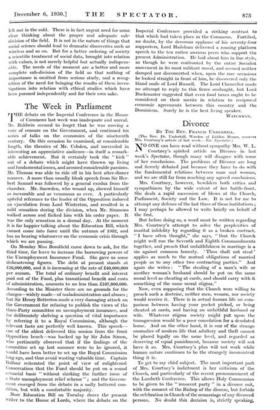The Week in Parliament
rpE debate on the Imperial Conference in the House
I of Commons last week was inadequate and unreal.
Mr. Baldwin seemed to forget, that he was moving a vote of censure on the Government, and continued his series of talks on the economics of the nineteenth century. On this occasion he examined, at considerable length, the theories of Mr. Cobden, and succeeded in interesting an appreciative audience—in itself a remark- able achievement. But it certainly took the " kick " out of a debate which might have thrown up living and fundamental issues, and aroused considerable passions. Mr. Thomas was able to ride off in his best after-dinner manner. A more than usually bleak speech from Sir Her- bert Samuel was followed by a general exodus from the chamber. Mr. Snowden, who wound up, showed himself as inexorable and as venomous as ever. A particularly spiteful reference to the leader of the Opposition induced an ejaculation from Lord Winterton, and resulted in a mild sensation during the division, when Mr. Simmons walked across and flicked him with his order paper. It was the only sensation in a dismal day. At the moment it is far happier talking about the Education Bill, which cannot come into force until the autumn of 1932, and has no bearing whatsoever on the economic crisis through which we are passing.
On Monday Miss Bondfield came down to ask, for the third time, for leave to increase the borrowing powers of the Unemployment Insurance Fund. She gave us some disheartening figures. The debt at present stands at £50,000,000, and it is increasing at the rate of £40,000,000 per annum. The total of ordinary benefit and interest paid out of the Fund, plus transitional benefit and costs of administration, amounts to no less than 1107,000,000. According to the Minister there are no grounds for the charges—widely made—of maladministration and abuses ; but Sir Henry Betterton made a very damaging attack on the Government for refusing to publish the views of the three-Party committee on unemployment insurance, and for deliberately shelving a question of vital importance by referring it to a Royal Commission, although the relevant facts are perfectly well known. This speech— one of the ablest delivered this session from the front Opposition bench—was backed up by Sir John Simon, Iyho pertinently observed that if the findings of the committee set up last summer were to be ignored, it would have been better to set up the Royal Commission long ago, and thus avoid wasting valuable time. Captain Balfour reiterated the point of view of enlightened Conservatism that the Fund should be put on a sound actuarial basis " without shirking the further issue of a State unemployment relief scheme " ; and the Govern- ment emerged from the debate in a sadly battered con- dition, but with a comfortable majority.
More Education Bill on Tuesday drove the present writer to the House of Lords, where the debate on the
Imperial Conference provided a striking contrast to that which had taken place in the Commons. Fortified, no doubt, by the decorous applause of his seventy-four supporters, Lord Hailsham delivered a rousing platform speech to the ten rather anxious peers who support the present Administration. He laid about bins in fine style, as though he were confronted by the entire Socialist movement in its most militant mood, and seemed neither damped nor disconcerted when, upon the rare occasions he looked straight in front of him, he discovered only the bland smile of Lord Russell. The Lord Chancellor made no attempt to reply to this fierce onslaught, but Lord Buckmaster suggested that even food taxes ought to be considered on their merits in relation to reciprocal economic agreements between this country and the Dominions. Surely he is the best living speaker.
WATCHMAN.


























































 Previous page
Previous page